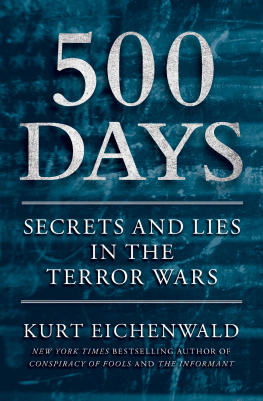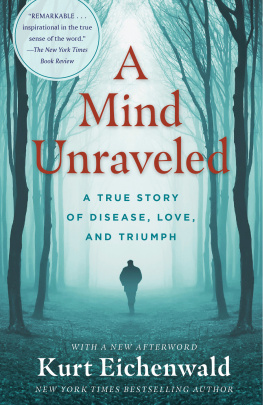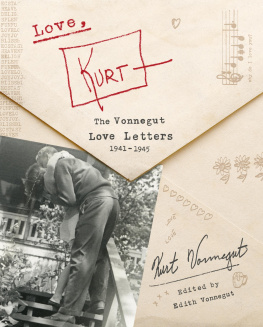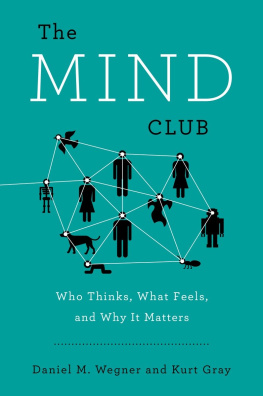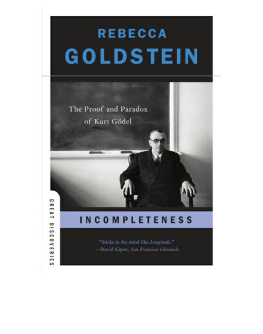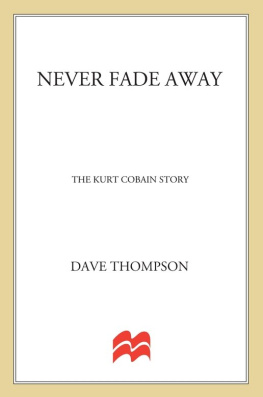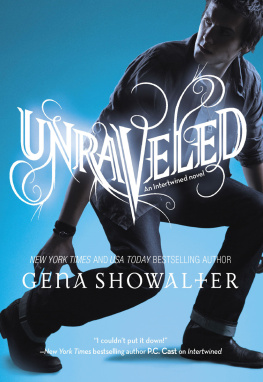Kurt Eichenwald - A Mind Unraveled - A Memoir
Here you can read online Kurt Eichenwald - A Mind Unraveled - A Memoir full text of the book (entire story) in english for free. Download pdf and epub, get meaning, cover and reviews about this ebook. year: 2018, publisher: Random House Publishing Group, genre: Detective and thriller. Description of the work, (preface) as well as reviews are available. Best literature library LitArk.com created for fans of good reading and offers a wide selection of genres:
Romance novel
Science fiction
Adventure
Detective
Science
History
Home and family
Prose
Art
Politics
Computer
Non-fiction
Religion
Business
Children
Humor
Choose a favorite category and find really read worthwhile books. Enjoy immersion in the world of imagination, feel the emotions of the characters or learn something new for yourself, make an fascinating discovery.

- Book:A Mind Unraveled - A Memoir
- Author:
- Publisher:Random House Publishing Group
- Genre:
- Year:2018
- Rating:3 / 5
- Favourites:Add to favourites
- Your mark:
- 60
- 1
- 2
- 3
- 4
- 5
A Mind Unraveled - A Memoir: summary, description and annotation
We offer to read an annotation, description, summary or preface (depends on what the author of the book "A Mind Unraveled - A Memoir" wrote himself). If you haven't found the necessary information about the book — write in the comments, we will try to find it.
A Mind Unraveled - A Memoir — read online for free the complete book (whole text) full work
Below is the text of the book, divided by pages. System saving the place of the last page read, allows you to conveniently read the book "A Mind Unraveled - A Memoir" online for free, without having to search again every time where you left off. Put a bookmark, and you can go to the page where you finished reading at any time.
Font size:
Interval:
Bookmark:

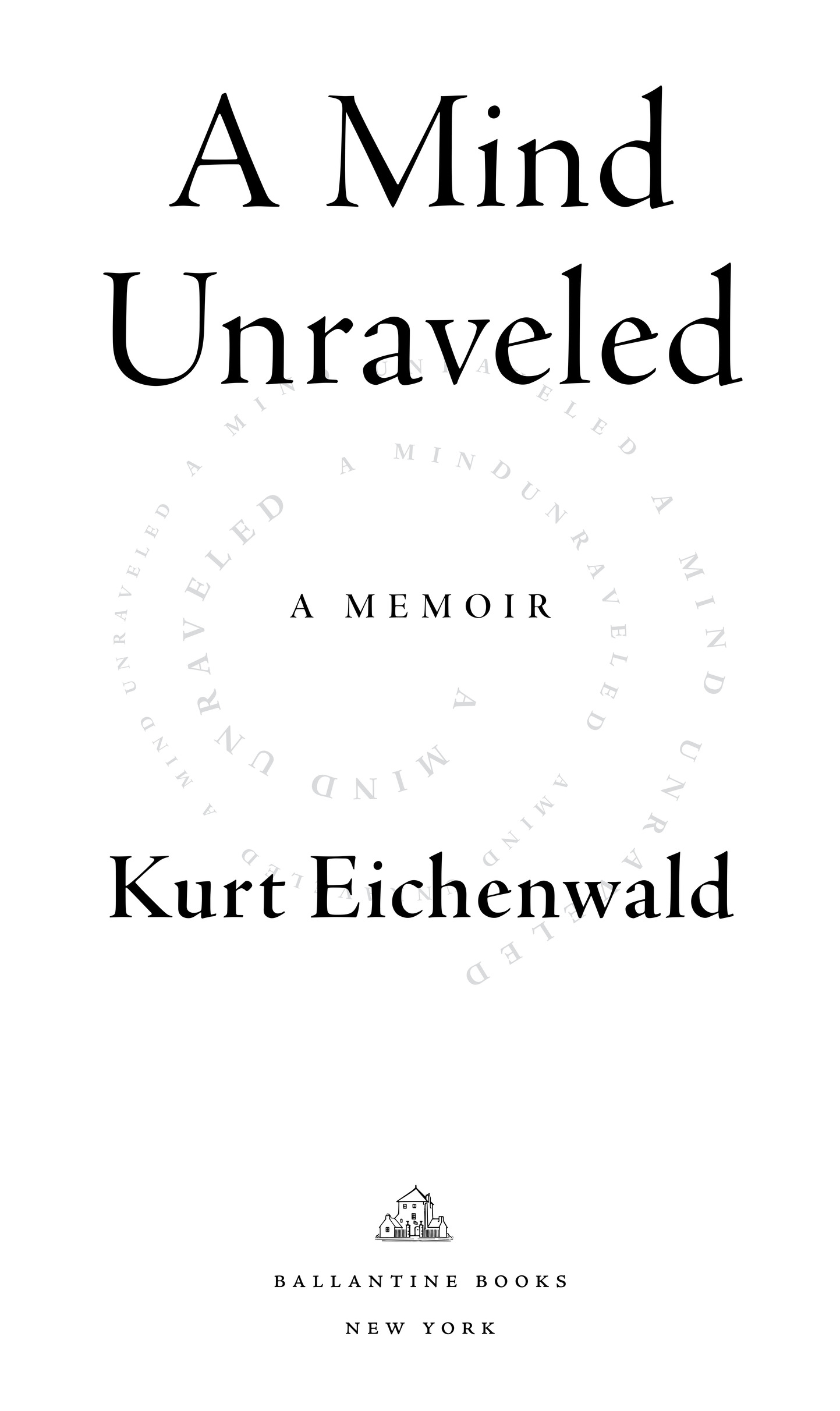
Copyright 2018 by Kurt Eichenwald
All rights reserved.
Published in the United States by Ballantine Books, an imprint of Random House, a division of Penguin Random House LLC, New York.
B ALLANTINE and the H OUSE colophon are registered trademarks of Penguin Random House LLC.
L IBRARY OF C ONGRESS C ATALOGING-IN- P UBLICATION D ATA
Names: Eichenwald, Kurt, author.
Title: A mind unraveled : a memoir / Kurt Eichenwald.
Description: First edition. | New York : Ballantine Books, [2018]
Identifiers: LCCN 2018018965 | ISBN 9780399593628 (hardcover) | ISBN 9780399593635 (ebook)
Subjects: LCSH: Eichenwald, Kurt, 1961Health. | EpilepticsUnited StatesBiography. | LCGFT: Autobiographies.
Classification: LCC RC372 .E33 2018 | DDC 616.85/30092 [B]dc23
LC record available at https://lccn.loc.gov/2018018965
Ebook ISBN9780399593635
randomhousebooks.com
Book design by Jo Anne Metsch, adapted for ebook
Cover design: Rachel Ake
v5.3.2
ep
You may encounter many defeats, but you must not be defeated. In fact, it may be necessary to encounter the defeats, so you can know who you are, what you can rise from, how you can still come out of it.
MAYA ANGELOU
This book may raise a few questions, the most obvious being: How can readers trust the recollections of someone whose memory has been impaired by decades of seizures? The answer is simple. Throughout most of my experiences, I kept diaries, notes, and tapes, largely because I found a benefit in recounting thoughts and feelings I shared with no one. I also retained medical documents, letters, and other contemporaneous papers. Later, I interviewed friends, family, doctors, and colleagues, who related their perspectives. While digging through old papers, I also discovered a box filled with tapes that were recorded in the 1980s by people who went through these events with me. Two of the speakers say I requested the recordings and promised not to listen to them for decades. I do not remember asking for them, but these proved invaluable, allowing me to gain insight into the experiences and emotions of friends and family that otherwise I never would have known. Passages from these old recordings are included after most chapters in this book.
I had never reviewed all of the diaries and recordings until undertaking this project, and the level of detail they contain astonished me. In them, I seemed driven to describe every sight, every sound. I commented on chair squeaks, expressions, tones of voice. Perhaps I needed to paint a mental image for my future reference, perhaps my medications led me to ramble, perhaps reciting obsessive detail was my way of finding control in an uncontrolled situation. Whatever the reason, these records helped me reconstruct events I dont remember.
Then there is the nature of memory. As anyone with recollection problems can attest, it is not like a bucket that is either filled with water or not. There are pieces and pathwayswhich even neuroscientists only vaguely understandwoven into the tapestry of brain function that dictate whether memories stay or fade.
Names, including those of people I have known for years, are hard to retrieve, which has led me to techniques that allow me to dodge saying them. I often rely on nicknames, such as calling my editors Boss. If my wife, Theresa, and I run into acquaintances or friends, she will casually utter their names so I can hear them. There have also been times when names of objects have been hard to recollect. I once stared at a chair trying to connect a word to this wooden thing with four legs; eventually, I recalled a term, but I couldnt move the sound from my mind to my mouth. So I just pointed.
Inconsequential or stress-free occurrences often disappear, which can be saddening, since I often forget vacations or nice experiences with my family. Sometimes, though, Im glad memories fadefor example, I forgot a dental surgery; I know it occurred only because Theresa told me when I found gizmos intended for me to use after the procedure. I watch reruns of my beloved Law & Order over and over without remembering who committed the crime. I sat three times through my favorite movieMemento, about a man with severe memory problemseach time knowing only that I loved the film; otherwise, it was all new to me.
Recollections of traumatic or important or funny events tend to remain accessible; in fact, they are surprisingly vivid. Then there is a technique others with memory problems will understand: remembering to remember. If I experience a short-term event of little significance but that I know I want to recall, at times I am able to store the memory if I focus on retention. I cannot do that with everything since, if I did, I would be standing in silence endlessly, thinking about remembering.
My age at the time of an event also plays a role. The deterioration of my memory seems to have begun when I was nineteen, after the seizures escalated. So I have found that I recall events from when I was younger with little difficulty.
Another question: Why would someone with an impaired memory become a journalist? Parts of this book address that subject, but the basic answer is simple: I wanted to and could. People with memory problems find compensation tricks, and I am certain those made me a better journalist. Moreover, once I accepted the magnitude of my memory problems (it takes time to recognize how much you forget once youve forgotten it), I was already successful, and no one was challenging the accuracy of my work.
In writing about myself, however, the techniques I describe above have limits. Often there is an amnesia surrounding a seizure that leaves me incapable of remembering. For example, in 2018 I learned from a good friend of my mothers that many years ago, I was arrested by police who misinterpreted my post-seizure symptoms as inebriation. The friend says I was taken to jail and locked up in the drunk tank. Somehow my mother learned of my arrest and attempted, unsuccessfully, to persuade the officers by phone that I did not drink alcohol and must be in a post-seizure state. Fearing I would go for too long without my medication, she boarded a plane, flew to wherever I was, bailed me out, and then bawled out the police. She died in 2016 and never told me this story, most likely because she thought it would upset me. I remember nothing about it, although it is disturbing to discover I probably have an arrest record somewhere.
Seizures also made it difficult over the years for me to fully recall events that had occurred just hours before, impeding my ability to write down what had happened. In those instances, trying to remember was like watching a silent movie while wearing a blindfold that is periodically removed for a few seconds and then tied back on. In other words, there are blank spots. When necessary, I cite missing chunks of memory involving events I describe here. Sometimes, there are occurrences I remember, but I have no idea when they took place. Several appear in this book at the point I believe most accurate, but I note that I am not certain of the timing.
Obviously, I am not claiming the dialogue in this book is a verbatim transcript. Much of it I recounted in my diaries within days or hours of my experiences. Friends and family did the same for me over the years when I asked for their recollections. I believe that reconstructing the conversations from this source material provides a far more accurate portrayal of what happened than mere paraphrase would.
Font size:
Interval:
Bookmark:
Similar books «A Mind Unraveled - A Memoir»
Look at similar books to A Mind Unraveled - A Memoir. We have selected literature similar in name and meaning in the hope of providing readers with more options to find new, interesting, not yet read works.
Discussion, reviews of the book A Mind Unraveled - A Memoir and just readers' own opinions. Leave your comments, write what you think about the work, its meaning or the main characters. Specify what exactly you liked and what you didn't like, and why you think so.

